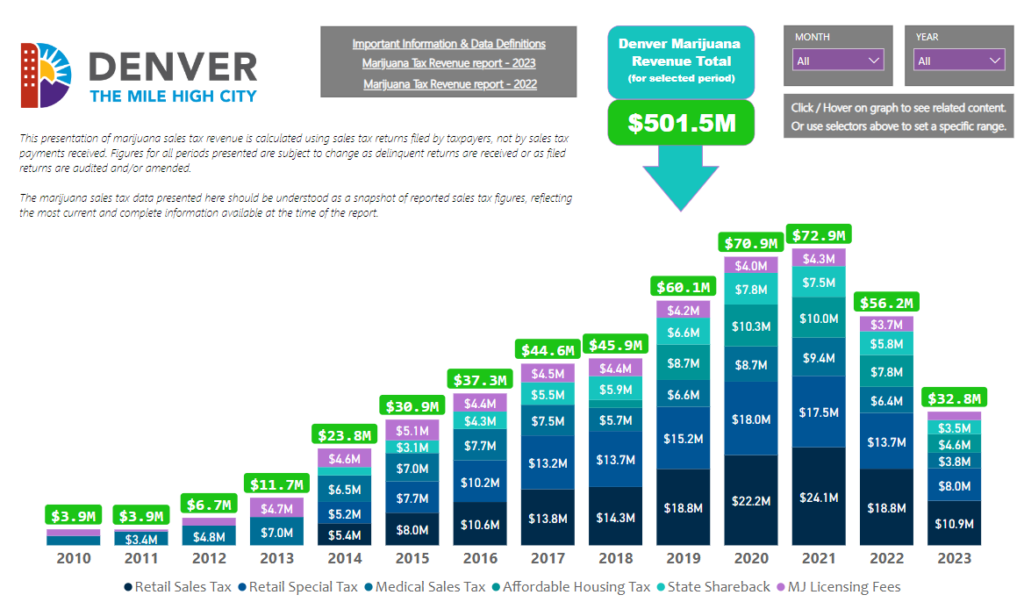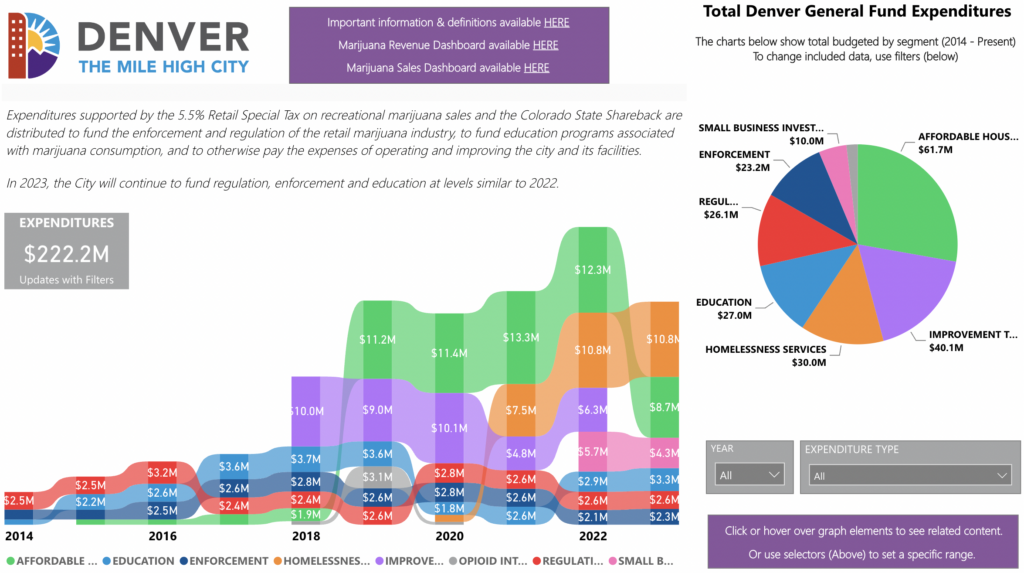Denver has achieved a new marijuana milestone, with adult-use and medical cannabis tax revenue now exceeding $500 million since 2010, city data released on Monday shows.
As Colorado touts the fact that adult-use retailers have now sold more than $15 billion in marijuana products since legalization, the state’s largest city has released a report that shows how those purchases locally have translated into hundreds of millions in tax dollars to support public programs and services.
Since 2010—four years before adult-use shops opened in Colorado—Denver has yielded $501,538,144 in cannabis tax revenue, including money generated from medical marijuana sales, the city is reporting. It crossed the half-billion-dollar threshold in August, the latest month for which revenue data is available.

The tax dollars come from a variety of sources, including the retail and medical cannabis sales tax, retail special tax, affordable housing tax, state share-back and marijuana business licensing fees. So far this year alone, Denver has taken in about $33 million in cannabis tax revenue.
Those taxes come from about $5.7 billion worth of marijuana sales in Denver since 2010. The total for 2023 is just over $300 million in cannabis purchases as of August.
Accordingly, Denver has been a major driver of the state’s overall cannabis economy, which has seen more than $2.5 billion in marijuana tax revenue generated since recreational sales launched in 2014, supporting public programs and services.
In Denver, city officials report that $61.7 million of cannabis revenue has been used to support affordable housing, $30 million has been allocated to homelessness services, $27 million has gone to education, $10 million has been put into small business investment and $4 million has been used for opioid intervention, for example.

Colorado was the first state to launch adult-use marijuana sales following voters’ approval of a legalization initiative at the ballot in 2012. Annual sales peaked in 2021, when they reached about $2.2 billion, but they’ve since declined and largely leveled out in the past two years. That overall trend has been consistent with Denver’s experience as well.
Earlier this year, Denver separately released a report indicating that its local regulatory framework for marijuana has effectively reduced the size of the illicit market, with law enforcement processing a record low amount of illegal cannabis in 2022.
Meanwhile, an analysis from the state’s nonpartisan Legislative Council Staff (LCS) that was released in August also showed that Colorado generated more tax revenue from marijuana than alcohol or cigarettes during the last fiscal year, with $280 million in cannabis tax dollars going toward a variety of government programs and services like K–12 education and health care.
The U.S. Census Bureau has started keeping tabs on state cannabis sales and tax revenue data, even as the plant continues to be federally prohibited. And a recent Census report shows that Colorado is one of five states that have consistently seen cannabis revenue make up at least one percent of all state income over the past two years.
For his part, Gov. Jared Polis (D) has been a longstanding champion of legalization, and he’s worked to build on the existing industry while also pushing for federal reform.
The @CO_Revenue (DOR) recently released a monthly cannabis sales report showing that adult-use and medical cannabis sales surpassed $15 billion since 2014, generating $2.5 billion in tax revenue. https://t.co/3ilDKCqIew pic.twitter.com/vIdjigkFoY
— Governor Jared Polis (@GovofCO) October 21, 2023
He recently applauded President Joe Biden after his administration’s top health agency recommended rescheduling marijuana—but he says the initial move must be followed with more action to address cannabis banking, immigration, criminal justice reform and federal enforcement concerns.
The governor has also called on lawmakers to take steps to allow him to issue mass pardons for people with prior psychedelics convictions after he signed legislation to implement regulations for substances like psilocybin and ayahuasca in May.
Polis also signed a bill into law in June that allows online marijuana sales. That reform went into effect in August.
He’s further approved legislation that will bolster marijuana-related protections for working professionals in the state—effectively codifying an executive order he issued last year.
New Jersey Regulators Seek Input On Expanding Marijuana Edibles To Include Infused Drinks, Baked Goods And More
Photo courtesy of Philip Steffan.
Read the full article here

